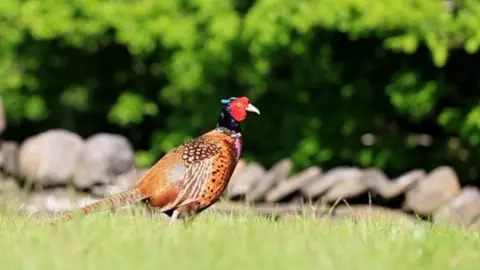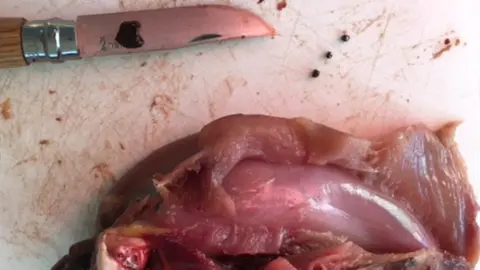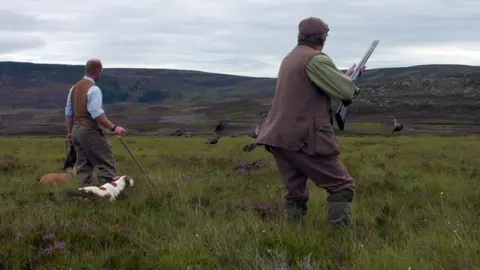Most pheasants sold for food 'contain lead shot'
 Victoria Gill
Victoria GillAlmost all pheasants sold for food in the UK contain toxic lead shot, scientists have found.
The discovery comes one year into a five-year transition to non-toxic shotgun ammunition - a move backed by nine UK shooting organisations.
Of 180 birds examined by the scientists, 179 were shot with lead.
One shooting group said finding humane and effective alternatives to lead would take time.
'No detectable impact'
The team, consisting of scientists and conservationists based across England and Scotland, bought wild-shot common pheasants that were sold by game dealers, butchers and supermarkets around the UK.
With labs closed in lockdown, the scientists carried out the pheasant dissections in their own kitchens.
"We took out the shot and sent it off for analysis and 99% of the ammunition we extracted was lead," said Prof Debbie Pain, from Cambridge University.
"So really that hasn't declined at all since the shooting organisations signed up to the voluntary ban."
 Rhys Green
Rhys GreenThat voluntary ban was a declaration in February 2020 by shooting and countryside organisations, which all committed to phasing out lead shot and transitioning "completely" to non-toxic alternatives. Those alternatives are already widely available and include steel, bismuth and tungsten.
That commitment, the scientists conclude, has not yet had any detectable impact.
Lead is toxic even at very low concentrations, as Prof Rhys Green from Cambridge University explained.
"Over time, it has been banned from a progressively lengthening list of products, including plumbing, paints on things like children's toys and as an additive to petrol. And the maximum allowable concentration of lead in many foods has also been limited by an EU directive, which still applies in the UK," he said.
 Phil Coomes / BBC
Phil Coomes / BBC"But game meat products are not included on that list of foods, for reasons that are unclear. Currently, the amount of lead in game meat sold for human consumption is not regulated by law."
Lead shot also builds up in the environment.
"When lead is shot into wildlife, it can be eaten by predators like scavenging birds," Prof Pain explained. "And a lot of lead gunshot falls into the environment and it can then be eaten by wildfowl and terrestrial birds and cause poisoning."
The evidence about lead in the environment has led to an EU-wide ban on the use of lead shot over wetlands. But, because that restriction did not enter into force before the end of the Brexit transition period, it will not apply in the UK.
The British Association for Shooting and Conservation (Basc), which previously argued against any change in the rules on lead ammunition, now supports the voluntary transition, but told the BBC that "change is difficult" and would take time.
"Lead shot is the traditional ammunition for live quarry shooting - it has been for generations," said Steve Bloomfield from Basc. "[Our members] have to take time to try the alternatives - and those alternatives have to be effective and humane."
In Denmark, hunters have had to use those alternatives since 1996, when lead shot was banned for all hunting.
Prof Green said he hoped these findings would speed up the move away from lead shot.
"I hope, within a few years, lead shotgun ammunition is not being used at all for game shooting in the UK," he told BBC News.
"I have an open mind on whether this can be achieved through voluntary change or requires a government ban, but the evidence so far indicates that the voluntary approach needs to step up its effectiveness dramatically if it is to remain credible."
Follow Victoria on Twitter
